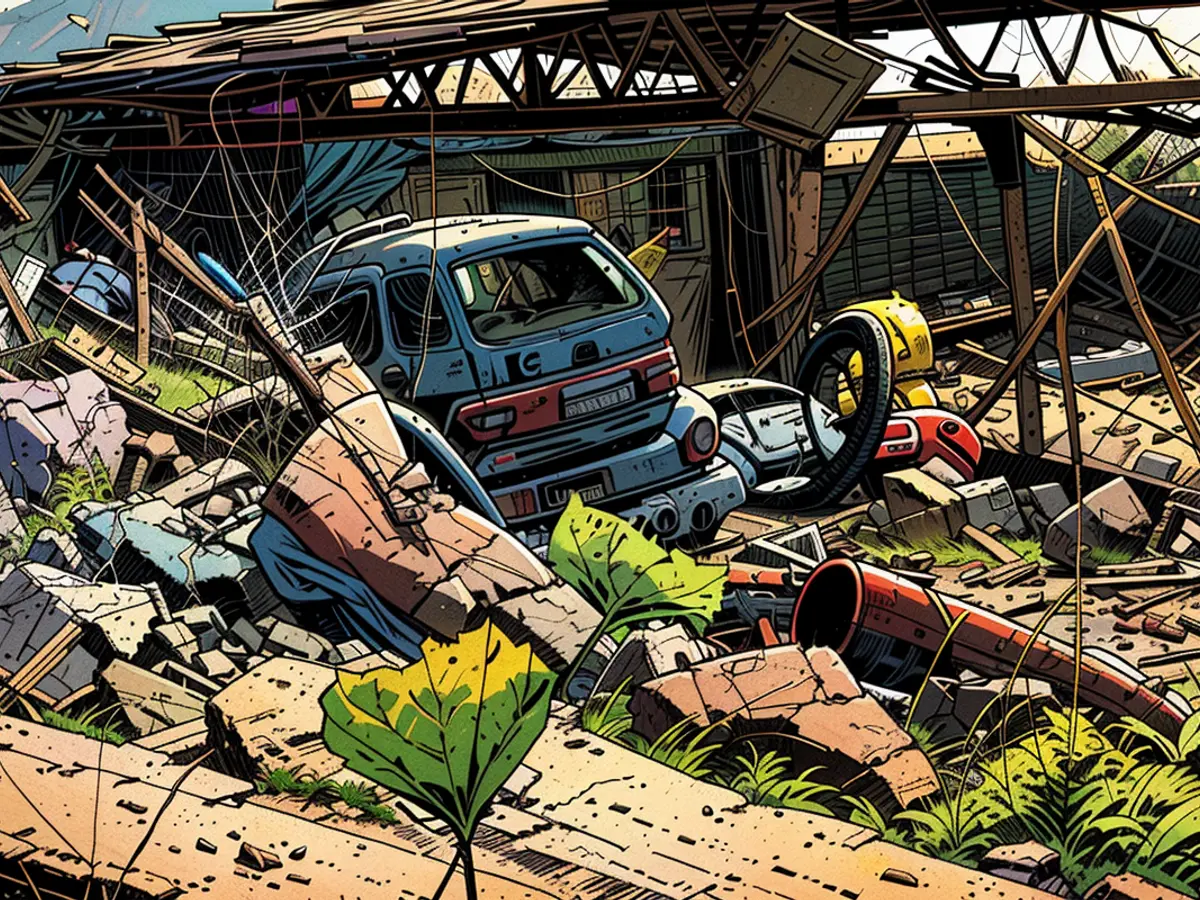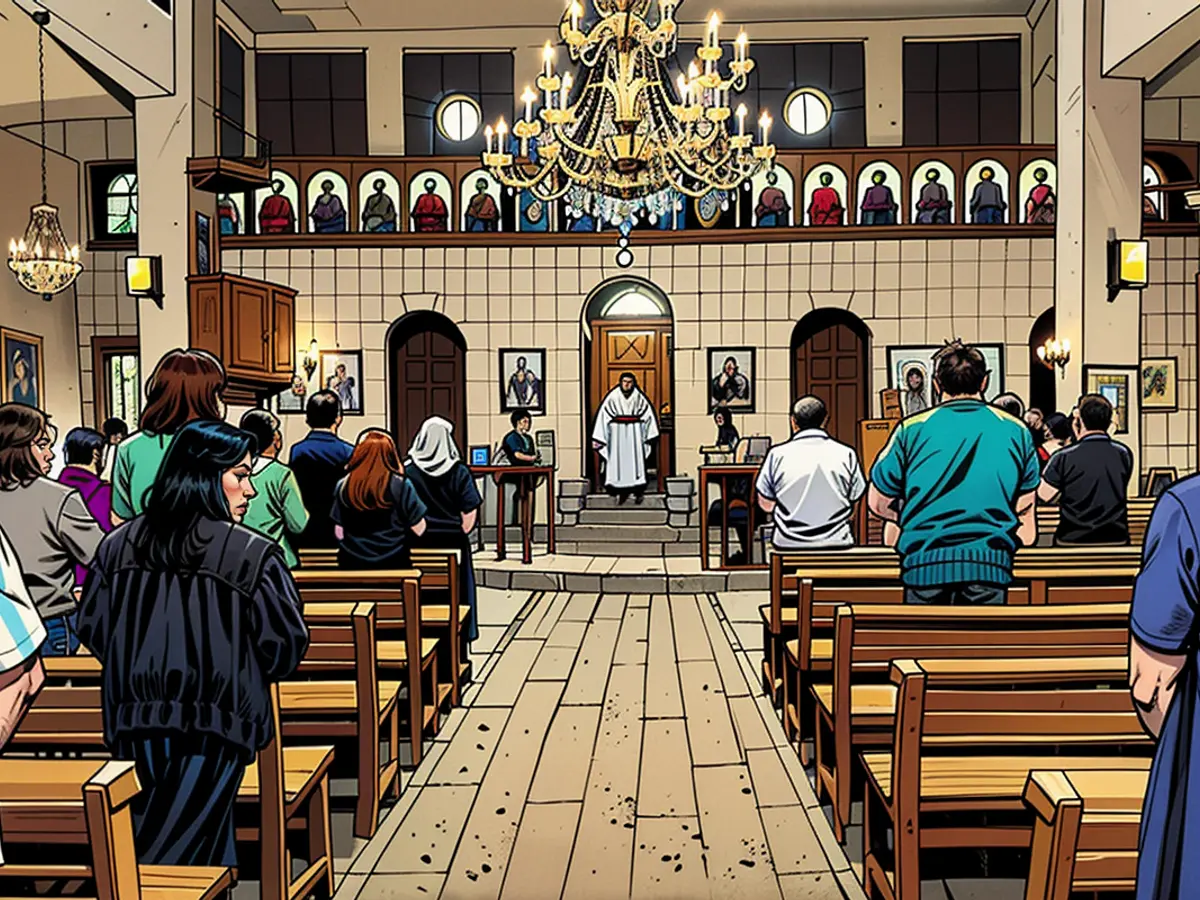"Locals on Lebanon's Israel border express dread over potential conflict": Citizens voice apprehension regarding another possible war.
A group of men play pool in a storefront adorned with mammoth statues of the Virgin Mary and Saint Charbel, a renowned Lebanese saint. They're reluctant to chat about the continuous conflicts and rumors of war that have haunted this predominantly Christian town close to the border. Journalists are seen as nuisances, one mutters, returning to his game.
On the other side of the square, a woman in her mid-thirties exits a grocery store carrying a small bag.
"Marjayoun is quite pleasant, it's incredible," the woman, named Claude, informs me. "But the shelling spooks us." That's all she's willing to share.
During the day, the distant booms of rocket fire can be heard echoing through the streets.
The intersection between Israel and Lebanon has grown increasingly tense since the October 7 attack by Hamas on Israel and the subsequent Israeli military campaign in Gaza. The Iran-supported militant group Hezbollah has been launching missiles, mortars, and drones towards Israel, while Israel has responded in kind.
Many people on both sides of the mountainous border have evacuated as concerns escalate about the potential outbreak of another full-scale war.
On the Lebanese side, residents of Shia-majority towns like Kafr Kila, Adaisa, Aita Al-Shaab and Aitaroun have mostly fled. Repeated Israeli airstrikes and artillery barrages have left many of these communities in ruins.
Compared to others, Marjayoun has been relatively untouched.
Once the headquarters of the Israeli-funded and armed South Lebanese Army (SLA), a Christian-led proxy militia, during Israel's long occupation of southern Lebanon, which ended 24 years ago following a continuous conflict with Hezbollah.
When Israel withdrew in 2000, many of Marjayoun's inhabitants fled south across the border to Israel, fearing accusations from fellow Lebanese citizens of collaborating with Israel.
The exodus, combined with Lebanon's crumbling economy, fear of another prolonged conflict, the absence of a functioning government, emigration, and war have drained Marjayoun of people and prosperity.
Even so, some residents persist in clinging to their ancestral town, swearing they won't leave.
"This area seems to be cursed with perpetual tension," Edouard Achy told me. "Threats are coming from both sides of the border. Tensions grow stronger day by day. Everything hints at an imminent event."

Is he planning to leave, I ask.
He shrugs. "After eight long months of this situation, people just want peace and quiet," he tells me.
His sister, Amal, and her family have come to church to offer a special prayer marking 40 days since their mother's death. Dressed in black and sporting a crucifix around her neck, she brought large loaves of bread and bags of rolls to share with the congregation.
Amal demonstrates a strong bond with her hometown, but questions how long it can remain safe as the storm clouds of war gather.
"We're staying put, and God-willing, we'll carry on," she insists. "The south is the Holy Land. The Messiah walked here two thousand years ago."
She pauses and sighs. "But if things turn violent and the fighting reaches here like it did before, with some shelling, of course, like others, we’ll have to leave," she admits.
‘In war, everyone suffers’
About a half-hour away, in the mostly Druze town of Hasbaya, 85-year-old Abu Nabil sweeps the street outside his store.
The Druze faith shares roots with Islam, and has followers in Lebanon, Syria, Israel, and Jordan.
A devout man with a kind smile and a bushy white mustache, he maintains a positive outlook on life. “The Lord is kind to us,” he says. “We can sleep in our homes. We eat. We drink. No one goes hungry.”
Since his birth, Abu Nabil witnessed Lebanon gain independence from France in 1943, flourish during the 1960s, plunge into civil war, invaded and partially occupied by Israel for years, and occupied partially by Syria, also for years.
He has witnessed the country emerge from civil war, engage in war again with Israel in 2006, experience a series of high-profile assassinations, endure a short-lived revolution in 2019, followed by economic collapse, and now once more on the brink of full-scale war with Israel.

“War is destructive,” he says, grasping my hand. “In war, everyone suffers, even the victor.”
Across the street, young men drink coffee from small paper cups while smoking cigarettes. They don't want trouble, they declare, declining to be interviewed.
The concern here, and in many parts of Lebanon, is that criticizing Hezbollah could result in repercussions. Some people do, some politicians do, but when Hezbollah is nearby, it's best not to take the risk.
"Gaza isn't my war, and I don't want to pray in Jerusalem," one of the men states.
Another says one reason no Israeli missile, bomb, or artillery round has struck Hasbaya is because young men act as a sort of armed neighborhood watch, ensuring no one, neither Hezbollah nor Hamas, fires anything at Israel. They consider it their territory, and they don't welcome outsiders, they say.
Traffic is slow-moving on the road leading out of Hasbaya west towards Marjayoun. Vehicles travel at a snail's pace, drivers poking their heads out to see what's happening.
A bustling horde of individuals, ranging from young to old, gather outside a pristine new white structure, adorning their finest attire. A sparkling white roadster, blanketed with arrangements of blooms, sits before it, the license plate stating in English, "Recently Wed".
A troop of men arrives, dressed in traditional Druze attire - small headgear, vests, and trousers falling low near the waist - carrying musical instruments such as drums and horns.
As individuals exit the building, musicians commence a boisterous melody with a robust rhythm and soaring notes, while others rhythmically swing prayer beads overhead.
The bride, Fatin, dressed in a lengthy, delicate dress, and the groom, Taymour, step into the daylight, meeting applause from the crowd.
I choose to disregard bothersome inquiries about politics, wars, demise, devastation and displacement. The general mood is one of joy, cherishing the brilliant June day, the commotion, the company of comrades and kin. "Why ruin such a delightful occasion?" I ponder.
Gazing upon the merriment, one would never suspect that Israeli military forces are merely a few miles away, and, nearby, lethal missiles are being launched back and forth across the boundary.

Yet, a man finds the irony humorously, as he leans over with a laugh, "We're partying here while war is about to erupt."
Read also:
In light of the escalating tensions between Israel and Lebanon, many residents are concerned about another potential conflict in the Middle East, with Claude from Marjayoun expressing her fear of shelling spooking them.
The international community is closely watching the situation along the Israel-Lebanon border, particularly as Hezbollah continues to launch missiles and drones towards Israel, contributing to a growing sense of unease throughout the region.







